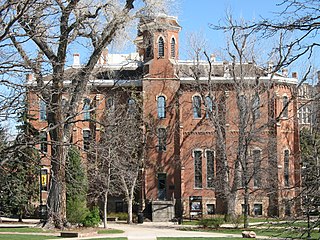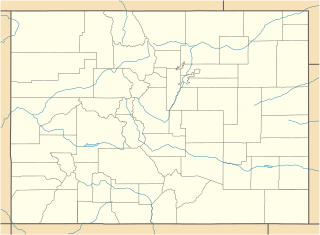Related Research Articles

The University of Colorado (CU) is a system of public universities in Colorado consisting of four campuses: University of Colorado Boulder, University of Colorado Colorado Springs, University of Colorado Denver in downtown Denver and at the Anschutz Medical Campus in Aurora. It is governed by the elected, nine-member Board of Regents of the University of Colorado.
A Terry stop in the United States allows the police to briefly detain a person based on reasonable suspicion of involvement in criminal activity. Reasonable suspicion is a lower standard than probable cause which is needed for arrest. When police stop and search a pedestrian, this is commonly known as a stop and frisk. When police stop an automobile, this is known as a traffic stop. If the police stop a motor vehicle on minor infringements in order to investigate other suspected criminal activity, this is known as a pretextual stop. Additional rules apply to stops that occur on a bus.

Ward LeRoy Churchill is an American author and political activist. He was a professor of ethnic studies at the University of Colorado Boulder from 1990 until 2007. The primary focus of his work is on the historical treatment of political dissenters and Native Americans by the United States government. His work features controversial and provocative views, written in a direct, often confrontational style.
Michael Tracey is a British-American academic and television producer with a specialty in public service broadcasting. He acquired notability as a result of his tenure as the head of the Broadcasting Research Unit in London, a British think tank dealing with media issues, and later with his investigative reporting on the death of JonBenét Ramsey. He is the author of The Decline and Fall of Public Service Broadcasting and the Production of Political Television. He is currently a professor at the University of Colorado at Boulder.

Race in the United States criminal justice system refers to the unique experiences and disparities in the United States in regard to the policing and prosecuting of various races. There have been different outcomes for different racial groups in convicting and sentencing felons in the United States criminal justice system. Experts and analysts have debated the relative importance of different factors that have led to these disparities.
Race is one of the correlates of crime receiving attention in academic studies, government surveys, media coverage, and public concern.

Racial biases are a form of implicit bias, which refers to the attitudes or stereotypes that affect an individual's understanding, actions, and decisions in an unconscious manner. These biases, which encompass unfavorable assessments, are often activated involuntarily and without the awareness or intentional control of the individual. Residing deep in the subconscious, these biases are different from known biases that individuals may choose to conceal for the purposes of social and/or political correctness. Police officers have implicit bias, regardless of their ethnicity. Racial bias in criminal news reporting in the United States is a manifestation of this bias.
The Ferguson effect is a hypothesized increase in violent crime rates in a community caused by reduced proactive policing due to the community's distrust and hostility towards police. The Ferguson effect was first proposed after police saw an increase in violence following the 2014 shooting of Michael Brown in Ferguson, Missouri. The term was coined by Doyle Sam Dotson III, the chief of the St. Louis police, to account for an increased murder rate in some U.S. cities following the Ferguson unrest. Whether the Ferguson effect really exists is subject of discussions with many published studies reporting contradicting findings concerning whether there is a change in crime rates, number of 911 calls, homicides, and proactive policing. Furthermore, the effect and influence of the portrayal of police brutality in the media is also contested.

On November 27, 2015, a mass shooting occurred in a Planned Parenthood clinic in Colorado Springs, Colorado, resulting in the deaths of three people and injuries to nine. A police officer and two civilians were killed; five police officers and four civilians were injured. After a standoff that lasted five hours, police SWAT teams crashed armored vehicles into the lobby and the attacker surrendered.
In the United States, use of deadly force by police has been a high-profile and contentious issue. In 2019, 1,004 people were killed by police shootings according to The Washington Post and 1,098 people were killed by police in total according to the "Mapping Police Violence" project.
The term shooting bias, also known as "shooter bias", is a form of implicit racial bias which refers to the tendency among the police to shoot black civilians more often than white civilians, even when they are unarmed. In countries where white people aren't the majority, shooting bias may still apply, with different minority groups facing discrimination.
Los Seis de Boulder were six Chicano activists and students killed in two car bombings in Boulder, Colorado. The bombings occurred at the end of May 1974, with the name Los Seis de Boulder coined posthumously. The students were protesting the negative treatment of Mexican-American students at the University of Colorado, Boulder at the time of their death. A monument was erected for them in Chautauqua Park on May 27, 2020.
William J. Lewinski is a retired psychology professor and expert on police use of force at his own Force Science Institute, founded in 2004. He provides training to police and serves as an expert witness in court cases.

On March 22, 2021, a mass shooting occurred at a King Soopers supermarket in Boulder, Colorado, United States. Ten people were killed, including a local on-duty police officer. The alleged shooter, Ahmad Al Aliwi Al-Issa, a 21-year-old Syrian born Muslim, was arrested after being shot in the right leg. He was temporarily hospitalized before being moved to the county jail. Legal proceedings against Al-Issa began on March 25.
References
- ↑ "Joshua Correll CV" (PDF). Retrieved 23 April 2017.
- ↑ "Racial 'hierarchy of bias' drives decision to shoot armed, unarmed suspects, CU-Boulder study finds". CU Boulder Today. 24 October 2012. Retrieved 23 April 2017.
- ↑ Peralta, Eyder (20 March 2012). "Trayvon Martin Shooting: What If Shooter Was Black?". NPR. Retrieved 23 April 2017.
- ↑ "Colorado Researcher Says Bias Is Hard to Shake". CBS Denver 4. 4 December 2014. Retrieved 23 April 2017.
- ↑ Gibson, Lydialyle (2007). "Shooter's choice". University of Chicago Magazine. Retrieved 23 April 2017.
- ↑ Walton, Alice (11 June 2015). "Shoot, or don't shoot?". Chicago Booth Review. Retrieved 23 April 2017.
- ↑ Carey, Benedict (2 June 2007). "Study Finds Police Training Plays Key Role in Shootings". The New York Times. Retrieved 23 April 2017.